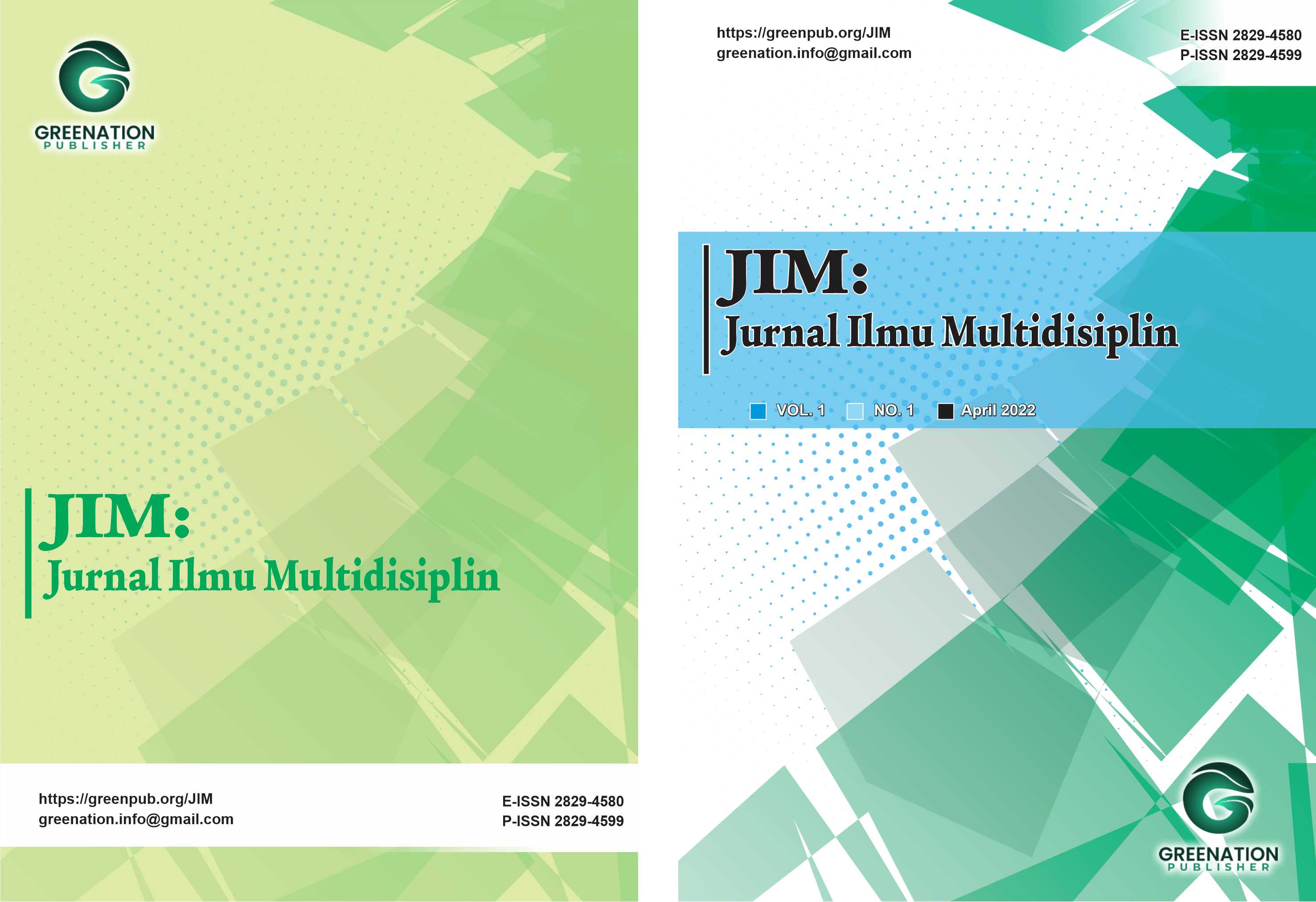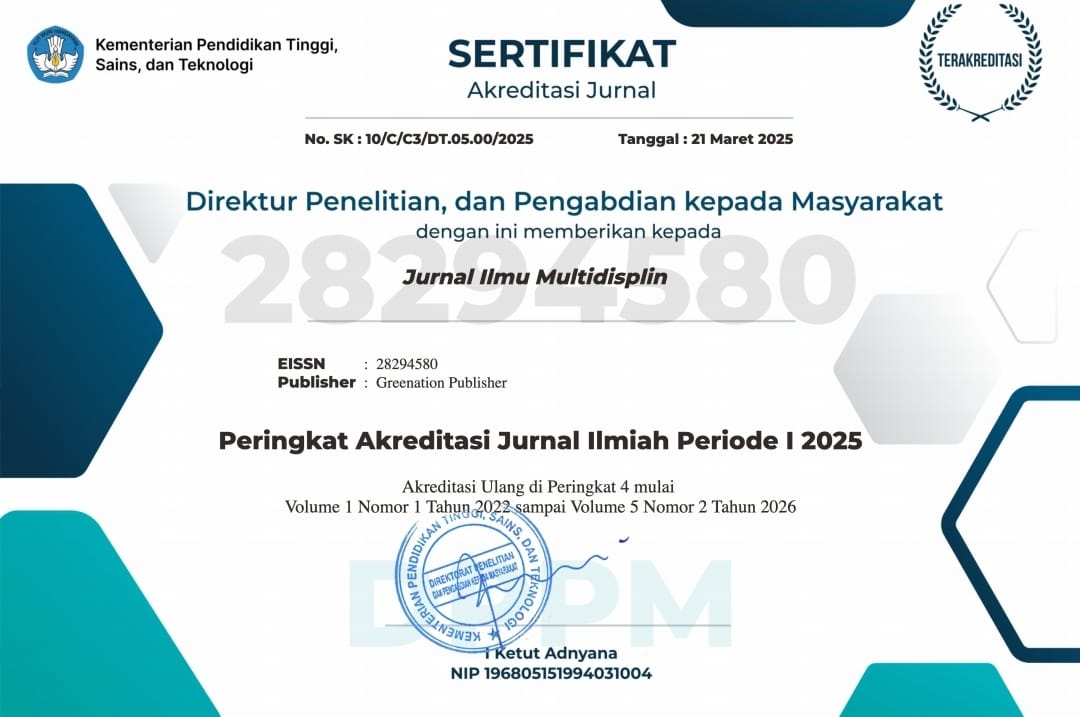The Impact of South China Sea Dispute on National Interests and Sovereignty of Indonesia
DOI:
https://doi.org/10.38035/jim.v4i2.1061Keywords:
South China Sea, Geopolitics, National Interest, SovereigntyAbstract
This study aims to examine the impact of the dynamics of the South China Sea dispute on the national interests and sovereignty of the Unitary State of the Republic of Indonesia. This study uses a qualitative research method with data analysis techniques consisting of data reduction, data presentation, and drawing conclusions. The theories used in this study are the theories of sovereignty, national interests, and geopolitics. The results of this study indicate that the dynamics of the dispute in the South China Sea region have shown signs of escalation that encourage the formation of expansionist geopolitics in regional countries. This condition can ultimately disrupt the achievement of the national interests of the Unitary State of the Republic of Indonesia and can threaten the sovereignty of the Unitary State of the Republic of Indonesia, especially in the Natuna waters. The Government of the Unitary State of the Republic of Indonesia is considered necessary to strengthen the maritime military, in this case the Indonesian Navy or TNI AL, to ward off traditional and non-traditional security threats, and optimize diplomacy through a regional approach to encourage the formation of a Code of Conduct (Coc) in the South China Sea region as soon as possible.
References
Agustin, D. (2021). Kapal AL China dan AS Berebut Pengaruh di Laut China Selatan. Republika. https://internasional.republika.co.id/berita/qrhe5j377/kapal-al-china-dan-as-berebut-pengaruh-di-laut-china-selatan
Ali, A. H. (2010). Dinamika Di Laut China Selatan Dan Implikasinya Terhadap Indonesia. Quarterdeck, 3(12), 6–12. http://library.stik-ptik.ac.id/file?file=digital/42805-Fkpm3-10-043.pdf
Asnani, Usman & Rizal Sukma. Konflik Laut China Selatan: Tantangan Bagi ASEAN. Jakarta: CSIS, 1997
BBC.com. “South China Sea: What is China’s plan for its “Great Wall of Sand?.” BBC.com, 14 Juli 2020. Accessed June 14, 2024. https:// www.bbc.com/news/world-asia-53344449
Beckman, Robert. 2013. “The South China Sea: the Evolving Dispute Between China and her Maritime Neigbours”. Geomatics World, Maret-April 2013 No. 3 Vol. 2, 21-23
C.F. Strong, 1975, Modern Political Constitution: An Introduction to the Comparative Study of their History and Existing Form, Sidwick and Jackson Limited, hlm. 6.
C.F. Strong, 1975, Modern Political Constitution: An Introduction to the Comparative Study of their History and Existing Form, Sidwick and Jackson Limited, hlm. 6.
Darajati, Muhammad Rafi; Adolf, Huala; and -, Idris (2018) "Putusan Sengketa Laut China Selatan Serta Implikasi Hukumnya Terhadap Negara Disekitar Kawasan Tersebut," Jurnal Hukum & Pembangunan: Vol. 48: No. 1, Article 2.DOI: 10.21143/jhp.vol.48.no.1.1594
Echevarria, Antulio J. II, “How Should We Think about “Gray-Zone” Wars?,” Infinity Journal, Volume 5, Issue 1, fall 2015, pages 16-20.
Emmers, Ralf, 2012, “ASEAN, China and the South China Sea: an opportunity missed”, IDSS Commentaries, 30/2012
Green, M., Hicks, K., Cooper, Z., Schaus, J., & Douglas, J. (2017). Countering Coercion in Maritime Asia: They theory and Practice of Gray Zone Deterrence. https://www.csis.org/analysis/countering-coercion-maritime-asia
Hawksley, Humphrey. Asian waters: the struggle over the Asia-Pacific and the strategy of Chinese expansion. 2018.
Herbanu, R. P., & Soediantono, D. (2018). Industri Pertahanan Indonesia Dalam Membangun Kekuatan Maritim Nasional. Journal of Industrial Engineering & Management Research, 3(4), 26–31.
Jackson, Robert dan Georg Sorensen, 2005, Pengantar Studi Hubungan Internasional, Pustaka Pelajar, Yogyakarta.
James J. Sheehan, 2006, The Problem of Sovereignty, The American History Review Vol III No. 1, February, hlm. 419
John W. Creswell, Research Design: Qualitative, Quantitative and mixed Approach (Terjemahan) (USA: Sage Publication, 1994).
Kompas, 2024. Sengketa Laut China Selatan dan Ancaman Kedaulatan Indonesia. Accessed June 14, 2024. https://kompaspedia.kompas.id/baca/paparan-topik/sengketa-laut-china-selatan-danancaman-kedaulatan-indonesia
L.Toruan, G. T. (2020). Peran Strategis Indonesia dalam Penyelesaian Konflik Laut China Selatan dalam Perspektif Stabilitas Keamanan Regional. Jurnal Keamanan Nasional, 6(1), 111–129. https://doi.org/10.31599/jkn.v6i1.449
Laksamana TNI (Purn) Prof. Dr. Marsetio. (2019). Sea Power Indonesia di Era Geo-Maritim.
Moleong, Lexy J. 2008. Metodologi Penelitian Kualitatif. Bandung: PT Remaja Rosdakarya. Muchithi, M. Saekhan. 2008. Pembelajaran Kontekstual. Semarang: Rasail Media Group.
Muhar, J. (2018). Sengketa Wilayah Maritim di Laut China Selatan. Jurnal Penelitian Hukum, 18(740), 22.
Parandaru, I. (2024). Sengketa Laut China Selatan dan Ancaman Kedaulatan Indonesia. Kompas Pedia. Accessed June 12, 2024. https://kompaspedia.kompas.id/baca/paparan-topik/sengketa-laut-china-selatan-danancaman-kedaulatan-indonesia
Pedrozo, Raul (2009) "Close Encounters at Sea," Naval War College Review: Vol. 62: No. 3, Article 8.
Plano, Jack C and Roy Olton, 1999, Kamus Hubungan Internasional dan Globalisasi Ekonomi, Ghalia, Jakarta
Puguh Sunoto, S., Aryanti Fahriani, A., & Napang, M. (2023). Dampak Sekuritisasi Konflik Laut Cina Selatan terhadap Keamanan Maritim Indonesia. Jurnal Kajian Stratejik Ketahanan Nasional, 6(2), 12–13. https://scholarhub.ui.ac.id/jksknAvailableat:https://scholarhub.ui.ac.id/jkskn/vol6/iss2/7
Ras, Abdul Rivai. Konflik Laut Cina Selatan dan ketahanan regional Asia Pasifik: sudut pandang Indonesia. Apsindo. Jakarta. 2001.
Robert C Beckman, Davenport, T. (2010). CLCS Submissions and Claims in the South China Sea. In Centre for International Law (CIL) National University of Singapore. http://cil.nus.edu.sg/wp/wp-content/uploads/2009/09/Beckman-Davenport-CLCS-HCMC-10-12Nov2010-1.pdf
Sigit Riyanto, 2012, Kedaulatan Negara Dalam Kerangka Hukum Internasional Kontemporer, Jurnal Yustisia, Vol. 1 No. 3, September-Desember, hlm. 7.
Sulisworo, D., Wahyuningsih, T., & Baehaqi, D. (2012). Hibah Materi Pembelajaran Non Konvensional?: Geostrategi Indonesia. Universitas Ahmad Dahlan, 1–29.
Sumadinata, W. S. (2022). Membangun Kebijakan Pertahanan Maritim Indonesia: Telaah Kritis Fungsi Keamanan Laut Tentara Nasional Indonesia Angkatan Laut. International Journal of Demos, 4(2), 722–731. https://doi.org/10.37950/ijd.v4i2.259
Sunoto, Suyud Puguh; Fahriani, Ade Aryanti; and Napang, Marthen (2023) "Dampak Sekuritisasi Konflik Laut Cina Selatan terhadap Keamanan Maritim Indonesia," Jurnal Kajian Stratejik Ketahanan Nasional: Vol. 6: No. 2, Article 7.
Victor Muhammad, S. (2021). Isu Laut Cina Selatan: Ekspansi Cina dan Pentingnya Kelanjutan Diplomasi. Info Singkat Bidang Hubungan Internasional: Kajian Singkat Terhadap Isu Aktual dan Strategis, Volume XIII, No. 5/I/Puslit/Maret 2021.
Viotti, Paul. R. dan Mark V. Kauppi, 1999, International Relations Theory: Realism, Pluralism, Globalism and Beyond, Allyn and Bacon, Boston.
Walts, Stephen. M, 1998, International Relations: One World Many Theories, Foreign Policy Spring
Wirtz, James J., 'The Sources and Methods of Intelligence Studies', in Loch K. Johnson (ed.), The Oxford Handbook of National Security Intelligence, Oxford Handbooks (2010; online edn, Oxford Academic, 2 Sept.2010), https://doi.org/10.1093/oxfordhb/9780195375886.003.0004,accessed12June 2024.
Zhu, C. (2012). China tests troubled waters with $1 billion rig for South China Sea. Reuters. Accessed June 11, 2024. https://www.reuters.com/article/idUSBRE85K03Y/
Downloads
Published
How to Cite
Issue
Section
License
Copyright (c) 2025 Patrick Abraham, Iga Karishma Maharani Raijaya

This work is licensed under a Creative Commons Attribution 4.0 International License.
You are free to:
- Share— copy and redistribute the material in any medium or format
- Adapt— remix, transform, and build upon the material for any purpose, even commercially.
The licensor cannot revoke these freedoms as long as you follow the license terms.
Under the following terms:
- Attribution— You must give appropriate credit, provide a link to the license, and indicate if changes were made. You may do so in any reasonable manner, but not in any way that suggests the licensor endorses you or your use.
- No additional restrictions— You may not apply legal terms or technological measures that legally restrict others from doing anything the license permits.
Notices:
- You do not have to comply with the license for elements of the material in the public domain or where your use is permitted by an applicable exception or limitation.
- No warranties are given. The license may not give you all of the permissions necessary for your intended use. For example, other rights such as publicity, privacy, or moral rightsmay limit how you use the material.



























